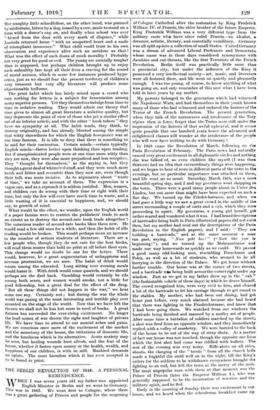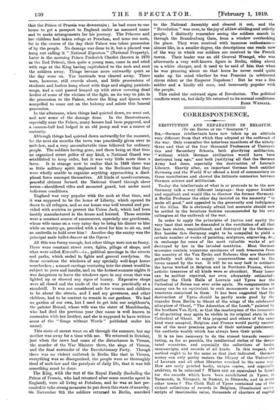THE BERLIN REVOLUTION OF 1818; A PERSONAL REMINISCENCE.
WHEN I was seven years old my father was appointed English Minister in Berlin and we went to Germany. This was in 1842. We went first to Cologne, where there was a great gathering of Princes and people for the reopening
of Cologne Cathedral after the restoration by King Frederick William IV. of Prussia, the elder brother of the future Emperor. King Frederick William was a very different type from the military caste who have since ruled Prussia—an idealist, a dreamer, artistic, literary, and essentially reamilitary. Germany was all split up into a collection of small States. United Germany waa a dream of advanced Liberal Professors and Democrats, whose name was in those days considered synonymous with Jacobins and cut-throats, like the first Terrorists of the French Revolution. Berlin iteelf was practically little more than a provincial city, but under the influence of the King it possessed a very intellectual society—art, music, and literature were all fostered there, and life went on quietly and pleasantly enough. I was too young, of course, to know anything of what was going on, and only remember of this now what I have been told in later years by my mother.
My parents belonged to the generation which had witnessed the Napoleonic Wars, and had themselves in their youth known many of those who had witnessed and endured the horrors of the Terror of the French Revolution. The present generation, when they talk of the narrowness and intolerance of the Tory regime then in force, forget that the Tories were still under the impression of the horrors of that awful upheaval, and it seerne quite possible that one hundred years hence the advanced and enlightened classes will wonder at the intolerance of the people who will now have nothing to do with Germany !
In 1848 came the Revolution of March, following on the Paris Revolution of February. The Paris news had naturally caused very great excitement in all diplomatic circles and nothing else was talked of, so even children like myself (I was then thirteen) had an idea that extraordinary things were happening, and we began to hear of rows in different parts of the town in the evenings, but no particular importance was attached to them, and life went on as usual. Saturday, March 18th, was a moat beautiful spring day, and I and my governess went shopping is the town. There were a good many people about in Unter den Linden, but not more than might have been expected on such a fine day. We turned up the Friedrichstrasse, and when us had gone a little way we saw a great crowd in the middle of the street surrounding a couple of carts and a cab, which they were proceeding to upset. My governess, a young girl herself, got rather scared and wondered what it was. I had hearddeseriptione of barricades being built in Paris (illustrated papers did not exist then, but my mother had read out the descriptions of the Paris Revolution in the English papers), and I said " They are building a barricade," and at the same moment a rose ran past, saying, "Nun geld for !" ("Now the row is beginning!"), and we turned up the Mohranstrasse and made our way homewards as quickly as we could. We passed a good many odd-looking men, resembling Frenchmen and Polep, as well as a lot of students, who seemed to be all hurrying in the direction of the Palace. We got home without further trouble. Our house was at the corner of two streets, and a barricade was being built across the corner right under my window. Just as we got in my father drew up in the " cab " (the fashionable vehicle of these days) in which he drove himself. The crowd recognized him, were very civil to him, and cleared a bit of the barricade to let his carriage through to get round to the stables. My mother, who had been out dining, had got home just before, very much alarmed because she had heard that there was fighting in the Friedrichstrasse, and knew that I had been going there. We watched from our windows the barricade being finished and maimed by a motley set of people. After some time a battalion of soldiers marched up the street.; a shot was fired from an opposite window, and they immediately replied with a volley of musketry. We were hurried to the back of the house to be out of the way of stray shots. As a matter of fact our house was not touched, though the opposite one from which the first shot had come was riddled with bullets. The rest of the evening was very noisy. Rifle-shots on all sides, shouts, the clanging of the " tocsin " from all the church bells made a frightful din until well on in the night, till the King's orders for the soldiers to be withdrawn every-where brought the fighting to an end, but left the town at the mercy of the mob. The most unpopular man with them at that moment was the
Prince of Prussia (later the Emperor William who was generally supposed to be the incarnation of reaction and the military spirit, and he fled. Early in the morning of Sunday there was excitement in our house, and we heard when the schoolroom breakfast came up that the Prince of Prussia was downstairs ; he had some to our house to get a passport to England under an seemed name and to make arrangements for his journey. The Princess and her children had taken refuge at Potsdam, and none too soon, for in the course of the day their Palace was taken possession of by the people. No damage was done to it, but a placard was hung out calling it " National Eigentum" (National Property). Later in the morning Prince Frederick Charles (known in 1870 as the Red Prince), then quite a young man, came in and oried with rage at the King having capitulated to the mob and sent the soldiers away. Things became more outwardly quiet as the day wore on. The barricade was cleared away. There were, however, still crowds about, and little processions of students and loafers hung about with flags and singing patriotic songs, and a cart passed heaped up with straw covering dead bodies of some of the victims of the fight, on its way to join in the procession to the Palace, where the King and Queen were compelled to come out on the balcony and salute this funeral procession.
In the afternoon, when things had quieted down, we went out, and saw some of the damage done. In the Brestestrasse, especially near the Palace, many houses had been peppered, and a cannon-ball had lodged in an old pump and was a source of curiosity.
Although things had quieted down outwardly for the moment, for the next six months the town was practically given over to mob-law, and a very uncomfortable time followed for ordinary people. The soldiers having gone, and there being at that time no organized street police of any End, a National Guard was established to keep order, but it was very little more than a farce. It is strange now to realize that in 1848 there was so little military spirit implanted in the Berliners that they were wholly unable to organize anything approaching a disci- plined force amongst themselves. All kinds of unadventurous, peaceful ;Athena formed the National Guard through sheer terror—shouldered rifles and mounted guard, but under most ludicrous conditions.
England was very popular with the mob at that time, and it was supposed to be the home of Liberty, which opened its doors to all refugees, and so our house was well treated and pro- vided with sentries to protect the Union Jack, which had been hastily manufactured in the house and hoisted. These sentries were a constant ammo of amusement, especially one gentleman, whose wife came on a very rainy day to bring his dinner to him while on sentry-go, provided with a stool for him to sit on, and an umbrella to hold over him I Another day the sentry was the principal male ballet-dancer at the Opera I
All this was funny enough, but other things were not so funny. There were constant street rows, fights, pillage of shops, and what were called Srawalle—i.e., political meetings in the streets and parks, which ended in fights and general rowdyism. On these occasions the windows of any specially well-kept home were broken ; a smart carriage venturing into the street would be subject to jeers and insults, and on the hottest summer nights it was dangerous to leave the windows open in any room that was lighted up or showed any signs of luxury. Expensive shops were all closed and the trade of the town was practically at a standstill. It was not considered safe for women and children to bo about the streets, and I and my governess, and other children, had to be content to remain in our gardens. We had no garden of our own, but I used to get into our neighbour's, the painter Hensel, whose wife was the sister of Mendelssohn, who bad died the previous year (her name is well known in connexion with her brother, and she is supposed to have written some of the "Songs without Words" published under his name).
This state of unrest went on all through the summer, but my mother was away for a time with me. We returned in October, just when the news had come of the dieturbanee in Vienna, the murder of the War Minister there, the siege of Vienna, and the final surrender of the Revolutionary Party. Though there was no violent outbreak in Berlin like that in Vienna, everything was an disorganized, the people were so thoroughly tired of mob-law and the paralysis of daily life, that it was felt something must he done.
The King, with the rest of the Royal Family (including the Prince of Prussia, who had returned after some menthe spent in England), were all living at Potsdam, and he was at last per- suaded to take strong measures to put down this state of anarchy. On November 9th the soldiers reburied to Berlin, marched to the National Assembly and °leered it out, and the " Revolution " was over, to thejoy of alllaw-abiding and orderly people. I distinctly remember seeing the soldiers marsh in through the Brandenburg Gate, from a window overlooking the place. They were received with immense enthusiasm— almost like, in a smaller degree, the descriptions one reads now of the way in which our soldiers are received in the French towns. Their leader was an old General Wrangel, who was afterwards a very well-known figure in Berlin, riding about on a white charger, and it used to be said of him that when he was prancing about on that horse he never could quite make up his mind whether he was Francini (a celebrated circus rider) or the Emperor Napoleon ! But he was a fine soldier and a kindly old man, and immensely popular with the people.
This ended the outward signs of Revolution. The political conflicts went on, but daily life returned to its normal conditions. Rosa WaroArz.



































 Previous page
Previous page